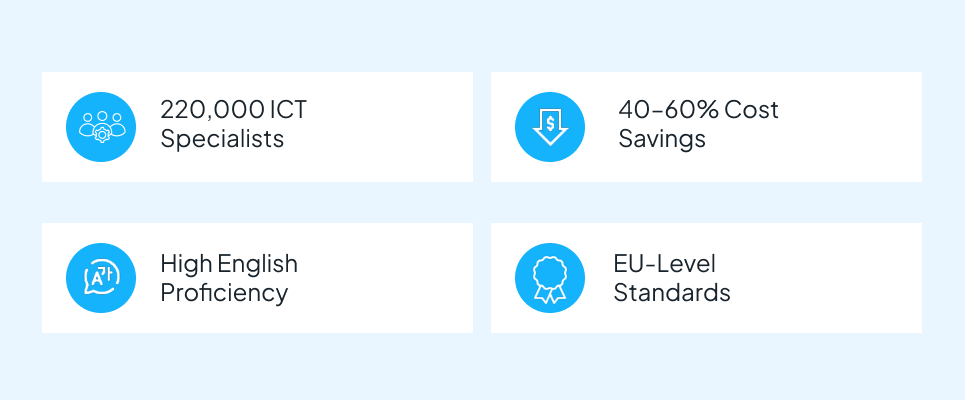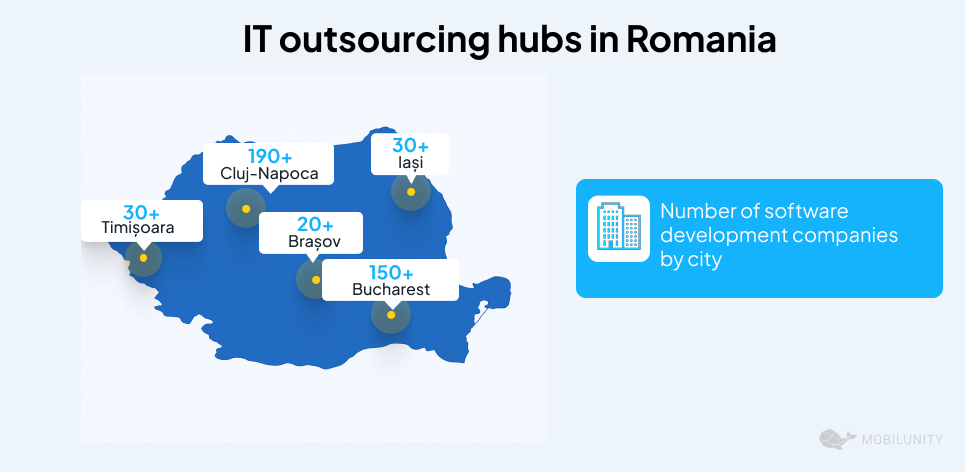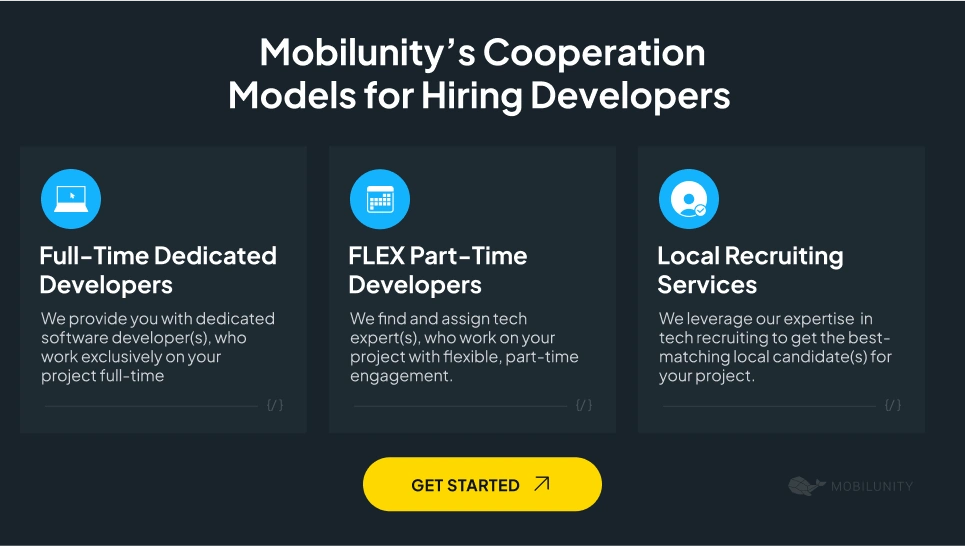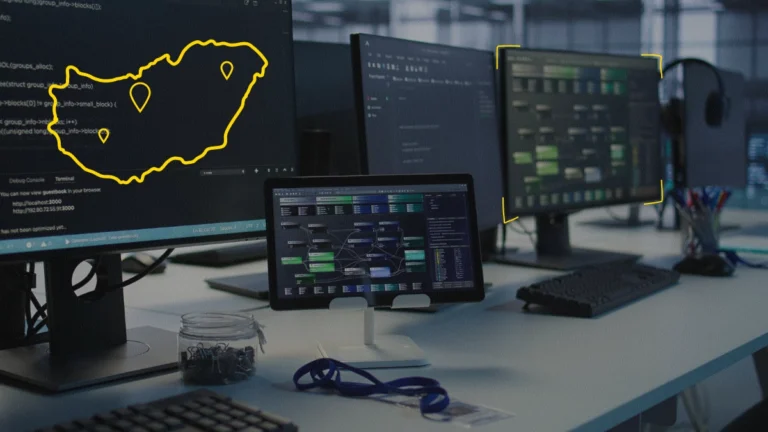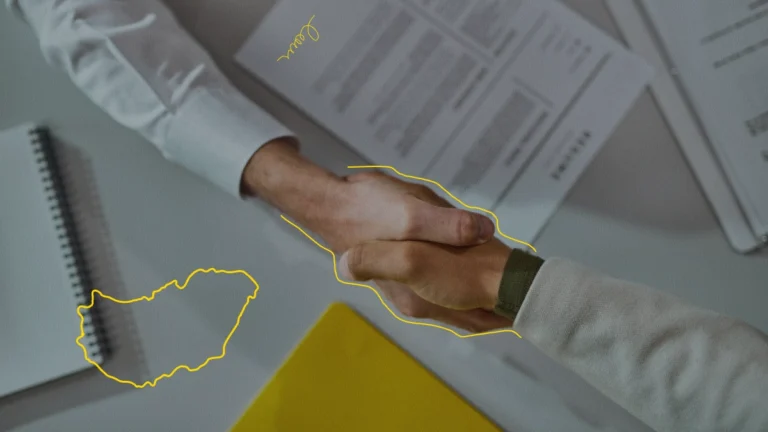Software Development Team Romania: Where Talent Meets Reliability
- Why Choose Romania to Build a Software Development Team
- Popular Technologies and Software Team Roles
- Cost of Building a Dev Team in Romania
- Engagement Models: How to Build a Software Development Team Romania
- Best Cities to Build a Dev Team in Romania
- Steps to Build Your Software Development Team
- Success Story: Fintech Expansion with Romanian Engineering Talent
- Mobilunity: A Reliable Partner for Building Your Romanian Development Team
- Wrapping It Up
As companies around the world look for reliable and cost-effective ways to expand their engineering capabilities, Romania has become a popular destination for building software development teams. Its growing IT ecosystem and effective communication culture make it an attractive choice for companies that value technical skills and a collaborative approach.
In this article, we’ll explore what makes Romania a great option for strengthening your development capabilities. We’ll look at talent availability, collaboration models, cost analytics, and some local specifics. You’ll gain a clear understanding of what to expect when building a software development team in Romania, and how to make the most of this opportunity.
Why Choose Romania to Build a Software Development Team
Building a reliable development team depends on access to skilled people and clear business conditions. Software development Romania meets these requirements. It offers a large pool of qualified engineers, operations that align with EU standards, and rates that make scaling practical.
Large IT Talent Pool
Romania is one of the largest tech talent markets in Eastern Europe, with around 220,000 ICT specialists employed in the country. It ranks 6th in the world for the number of certified IT professionals per capita, according to the U.S. International Trade Administration. This wide pool allows companies to create both small and large software development teams Romania across various technologies and experience levels.
EU Membership and Stable Legal Framework
As a member of the European Union, Romania adheres to EU business regulations and provides protections for intellectual property and data security standards like GDPR. This simplifies the process for international clients when managing compliance and cross-border operations. It is an important advantage when establishing a nearshore dev team Romania.
High English Proficiency and Technical Culture
Communication is generally straightforward. Romania consistently ranks in the “High Proficiency” category in the EF English Proficiency Index, above the global average. Along with a well-established engineering culture, local developers are familiar with agile workflows, teamwork across distances, and clear communication with Western clients.
Strong Technical Education
Romania’s universities produce skilled engineers, mathematicians, and IT specialists. Technical institutions such as the University Politehnica of Bucharest, Babeș-Bolyai University in Cluj-Napoca, and the Technical University of Iași graduate thousands of IT and computer science students every year, providing a steady talent supply for the software industry.
Quality of Work and Accountability
Romanian developers have built a reputation for their technical skills and sense of ownership. The country’s strong education system and engineering background lead to clean code and structured problem-solving. Teams here are experienced in working with Western partners and often share responsibility for product quality. This trait is essential for scaling complex projects effectively.
Scalable and Flexible Team Growth
Whether you need two developers or an entire engineering department, scaling your team in Romania is straightforward. The country’s large talent pool and strong recruitment framework make it easy to grow your team without disrupting existing operations.
Nearshore Advantage for European Companies
Romania’s location provides clear logistical and operational benefits. The time zone overlap with Western Europe is just one to two hours, which enables real-time collaboration, daily meetings, and quick feedback. For North American clients, the nearshore team Romania can ensure some workday overlap for smooth transitions.
Long-Term Cost Efficiency
Romania offers one of the most cost-effective environments for software engineering in the European Union. Salaries are competitive and operational expenses remain moderate. Moreover, the total cost of ownership for development is much lower than in Western Europe or North America. Salary inflation is predictable, and local tax rules are clear, helping companies plan budgets confidently.
Сompanies that establish a dedicated software team in Romania gain access to an ecosystem focused on quality, responsibility, and collaboration.
Popular Technologies and Software Team Roles
Romania’s tech ecosystem is diverse and well-established. It benefits from global demand and a strong local startup community. Companies can easily find experts in nearly every technology area, from backend engineering to DevOps and design.
Common Technologies
Developers in Romania often work with modern technologies suitable for web, mobile, and enterprise applications:
- Backend: Java, .NET, Python, and Node.js are common options for server-side systems and large platforms.
- Frontend: React, Angular, and Vue.js are the leading frameworks for creating fast, responsive user interfaces.
- Mobile Development: Swift and Kotlin are the primary choices for native mobile development. Flutter and React Native are becoming popular for cross-platform projects.
- Quality Assurance and Automation: Selenium, Cypress, Postman, and Jest are widely used along with continuous integration tools for testing.
- DevOps and Cloud: Docker, Kubernetes, Jenkins, and major cloud services like AWS, Azure, and Google Cloud support infrastructure and deployment.
Typical Team Composition
Romanian engineering teams resemble those in Western Europe and North America. They mix technical skills with a collaborative culture and clear role distribution:
- Backend and Frontend Developers handle feature development, integrations, and optimization.
- Team Lead or Architect sets the technical direction, ensures quality, and supports team growth.
- QA / Automation Engineers keep systems stable through testing and ongoing improvement.
- UI/UX Designers focus on usability, accessibility, and visual consistency.
- DevOps / Cloud Engineers oversee deployment, scalability, and performance.
In development setups, a Project Manager (PM) or Delivery Manager is not always part of the standard team. Their inclusion depends on how the client manages projects.
For fully client-managed teams, which are common in dedicated-team or staff-augmentation models, the PM usually works on the client’s side.
For end-to-end or hybrid models, a local PM or Delivery Coordinator is often brought in to manage time zones, track progress, and ensure clear communication.
Here is the example of a well-balanced team:
| Role | Typical Count | Core Responsibility |
| Team Lead / Architect | 1 | Defines technical direction, ensures code quality, and mentors developers. |
| Backend Developer | 2–3 | Handles core logic, API design, integrations, and database work. |
| Frontend Developer | 2 | Focuses on interface development, responsiveness, and performance improvement. |
| QA Engineer | 1–2 | Conducts automated and manual testing, and regression checks. |
| DevOps Engineer | 1 | Sets up CI/CD, handles deployments, and monitors infrastructure. |
| UI/UX Designer | 1 | Designs products, creates user flows, and conducts usability testing. |
| Project Manager (optional) | 1 | Oversees delivery, coordinates communication, and updates progress. |
This setup is effective for long-term web or mobile products that need ongoing feature delivery, regular maintenance, and scalability. It is often used for SaaS platforms, enterprise web applications, e-commerce systems, and other multi-component solutions where stable collaboration and consistent code are essential.
With flexible team setups, companies can easily match their structure and expertise with their product goals. The next step is understanding how much it really costs to build and maintain an application development team Romania.
Cost of Building a Dev Team in Romania
Understanding the cost to build software development team Romania goes beyond simply checking the salary tables. While salary rates are a key part of your budget, the full picture also includes recruitment, compliance, office expenses, and staff retention costs. Romania’s advantage lies in its balance, offering experienced engineers at reasonable and transparent prices within the legal and financial stability of the European Union.
Average Developer Salaries in Romania and Beyond
Based on verified Glassdoor data and XE.com exchange rates(≈ 1 USD = 4.43 RON), here are the developer salaries in Romania compared to major tech markets.
| Level | Romania | USA | Germany | UK | Ukraine |
| Junior Developer | $12,000 – $18,000 | $85,000 – $95,000 | $50,000 – $60,000 | $45,000 – $55,000 | $18,000 – $25,000 |
| Mid-Level Developer | $22,000 – $30,000 | $120,000 – $135,000 | $70,000 – $80,000 | $65,000 – $75,000 | $30,000 – $40,000 |
| Senior Developer | $35,000 – $45,000 | $150,000 – $170,000 | $90,000 – $105,000 | $80,000 – $95,000 | $45,000 – $55,000 |
The gap between Romania and Western markets is significant but strategic. A senior software engineer in Bucharest earns around $40,000 per year, which is less than half of what that role costs in Germany or the UK. It is nearly one-fourth of the U.S. salary levels. For mid-level developers, the difference remains steady, allowing companies to build strong, long-lasting teams at a fraction of Western budgets.
While the lower salary range makes Romania financially attractive, what really stands out is cost predictability.
In Addition to Developer Salaries
So what else should you budget for when hiring developers in Romania?
- Recruitment and onboarding: Local recruiting fees usually range from 20 to 25% of the annual gross salary. Even internal hiring teams need to budget for advertising, interviews, and onboarding time.
- Office and infrastructure: A fully serviced office in Bucharest or Cluj-Napoca costs about $110 to $450 per employee each month, depending on amenities and location. Many teams lower these expenses through hybrid or remote work arrangements.
- Legal and HR compliance: Payroll taxes and social contributions add roughly 35 to 40% on top of gross pay, a standard figure across EU markets. However, Romania’s legal system is transparent and aligns well with EU employment standards.
- Employee benefits: Competitive packages often include private healthcare, meal vouchers, and performance bonuses, which add another 5 to 10% to overall compensation.
Even when accounting for overhead costs, hiring a software team in Romania remains 40 to 60% cheaper than in Western Europe or North America. For companies focused on sustainable growth, this cost difference allows for reinvestment in product development and innovation, without sacrificing quality or communication standards.
Given the stable EU regulations and a growing pool of skilled professionals, developer salaries Romania highlight why many international companies continue to invest in long-term technical partnerships there.
Engagement Models: How to Build a Software Development Team Romania
Once you decide to expand your engineering capacity, the next question is how to do it effectively. Romania offers several engagement models that vary in management approach, cost distribution, and legal setup. Choosing the right one depends on how much control you want over daily operations and hiring.
Dedicated Development Team
This model lets you work with a long-term group of engineers focused exclusively on your product while they remain officially employed by a local service provider. You handle the roadmap and priorities, while the provider manages HR, payroll, and compliance.
Pros:
- Full focus on your product and processes.
- Transparent monthly cost structure.
- Fast scalability as needs change.
Cons:
- Management remains on your side; you set direction and priorities.
- Less suitable for short-term or one-off projects.
This setup works best for businesses that need reliable, ongoing development resources without the complexity of establishing their own legal entity in Romania.
Staff Augmentation
In this model, you hire individual developers or small groups to temporarily strengthen your in-house team. They integrate into your workflows, use your tools, and report to your managers; however, they are legally employed by a partner company.
Pros:
- Quick access to specific skills.
- Ideal for short-term tasks or project spikes.
- No recruitment or HR burden.
Cons:
- Not a long-term capacity solution.
- May require onboarding time to fit into your internal culture and standards.
Staff augmentation is a flexible, low-commitment way to address skill gaps or manage sudden workload increases.
R&D Office Setup
An R&D (Research & Development) center is a fully owned entity. Your company sets up a local office in Romania, hires employees directly, and runs operations independently.
Pros:
- Full control over team structure, policies, and intellectual property.
- Strong employer brand presence in the local market.
- Long-term investment in in-house expertise.
Cons:
- Requires legal registration, accounting, and administrative setup.
- Slower to start; higher initial cost.
This model is often chosen by large companies planning to stay in the market long-term or expand their global R&D network.
Employer of Record (EOR)
An Employer of Record acts as the legal employer on your behalf. The EOR manages payroll, taxes, contracts, and compliance while you direct the employee’s work. It’s a fast and compliant way to hire talent in Romania without opening a local office.
Pros:
- Rapid market entry; no entity setup required.
- Local employment and tax compliance handled by the EOR.
- Easily scales for distributed teams.
Cons:
- Slightly higher per-employee cost due to EOR service fees.
- Limited local branding opportunities.
The EOR model is suitable for companies testing a new market, hiring remote contributors, or managing distributed teams across multiple countries.
Each engagement model comes with its own level of control, speed, and responsibility, from full ownership to fully managed support. Together, they give companies the flexibility to hire Romanian developers in a way that best fits their growth stage and operational strategy. For companies looking to outsource a dev team in Romania effectively, this partnership offers long-term returns far beyond cost savings.
Best Cities to Build a Dev Team in Romania
Romania’s IT industry has several strong technology hubs across the country. Each city offers a unique blend of infrastructure, talent, and business culture, giving companies flexibility in their growth decisions. From the bustling energy of Bucharest to the innovation centers in Cluj-Napoca, top IT cities Romania provide the technical skills and global perspective that are perfect for development teams.
Bucharest
The capital remains the largest and most vibrant technology hub for software development outsourcing in Romania. Bucharest has the highest number of IT specialists, global tech companies, and startup accelerators. It hosts offices for Microsoft, IBM, Oracle, and many European engineering centers, along with a lively ecosystem of fintech and SaaS startups.
The city benefits from a dense network of universities and training centers that continuously supply skilled developers. For companies looking for senior engineers, project leads, and a wide hiring pool, Bucharest offers unparalleled reach.
Cluj-Napoca
Often referred to as the country’s “Silicon Valley,” Cluj-Napoca has earned its reputation through collaboration among academia, business, and government. The city is known for its innovation clusters, tech meetups, and forward-thinking startups that influence the national IT scene. It’s ideal for companies seeking balanced teams that are experienced enough to handle complex products yet agile enough to respond quickly.
Timișoara
Timișoara blends a rich industrial history with a rapidly growing tech sector. The city hosts global players in automotive software, electronics, and telecommunications while fostering a rising number of software development firms.
Its universities excel in computer science and automation, ensuring a steady stream of qualified graduates. Timișoara is a practical choice for cross-border collaboration and product engineering.
Iași
Iași is recognized for its academic excellence. Home to prominent universities with strong engineering and computer science programs, the city consistently produces a new generation of developers ready to enter the job market. Its lower living costs and rapidly expanding IT infrastructure make it an attractive option for companies looking for stable long-term growth.
In the past decade, Iași has transformed from a regional outsourcing center into a true innovation hub. International companies have already opened offices here, drawn by the availability of talent and the well-connected business community.
Brașov
Although it is smaller than Bucharest or Cluj, Brașov enjoys a strategic location, strong technical universities, and increasing investment in digital infrastructure.
Brașov’s appeal lies in its balance; it offers the tranquility of a smaller city along with the professionalism and educational standards needed for complex development work. Its growing pool of engineers and affordable office spaces make it an increasingly attractive option for building compact, efficient teams.
From the established capital to fast-growing regional centers, Romania’s IT cities have a clear advantage: they all provide access to skilled professionals, modern infrastructure, and a business environment that supports sustainable team growth.
Steps to Build Your Software Development Team
Creating a productive engineering team involves planning, clear communication, and reliable local support. Here is a practical six-step roadmap for building a successful team in Romania. Short tip: this team should align with your goals and deliver measurable results.
Step 1: Define Your Needs
Start with clarity. Outline your business goals and project timeline before you begin hiring. Identify which skills and technologies are critical for your product, how many engineers you need, and whether you want full-time or flexible collaboration. This initial definition shapes everything that follows, from partner selection to cost structure.
Step 2: Choose the Right Model and Partner
Decide which engagement model fits your growth strategy best. This could be a dedicated development team, staff augmentation, R&D setup, or EOR. Your choice determines the legal setup, management approach, and budget distribution. A trusted local partner can help you navigate Romanian labor regulations and assemble qualified candidates faster.
Step 3: Write Clear and Specific Job Descriptions
Precise job descriptions attract the right talent. Focus on responsibilities, required tech stack, and soft skills such as communication or problem-solving. In Romania’s competitive IT market, transparency and realistic expectations set your offer apart. Mention project impact and growth potential, as developers value context as much as salary.
Step 4: Recruitment and Screening
Use both local job boards and partner networks to reach qualified professionals. Screening should combine technical evaluation with cultural-fit interviews. Many companies use coding challenges or paired programming sessions to assess skills objectively. A local recruiter or HR team can shorten the hiring timeline by pre-selecting candidates who match your technical and cultural standards.
Step 5: Hiring and Onboarding
Once you select your candidates, formalize contracts in compliance with Romanian labor law. A structured onboarding plan helps new hires integrate faster, covering company culture and processes. Smooth onboarding builds engagement and reduces early turnover.
Step 6: Team Management and Growth
After your team is in place, focus on maintaining collaboration and performance. Establish regular communication, feedback cycles, and measurable goals. Encourage professional development through mentorship, certifications, or training. With clear leadership and support from your local partner, your Romanian team can operate as a seamless extension of your in-house engineering organization.
Building a development team in Romania is a process of aligning people, systems, and expectations. Following these steps ensures your team grows with purpose, remains efficient, and delivers consistent value over time.
Success Story: Fintech Expansion with Romanian Engineering Talent
A Western European fintech company reached out to Mobilunity when its internal team couldn’t keep up with rising development needs. The company’s financial platform was growing quickly, and the current engineers were struggling to improve backend performance and QA coverage. An additional task was to automate operations to reduce the time spent processing them.
The client needed to find several skilled specialists: two backend developers, one Java engineer, and one QA automation expert. The focus was on finding professionals with real experience in high-load financial systems and strong English communication skills. Romania was selected for its technical expertise, cost stability, and time-zone alignment with Western Europe.
Mobilunity’s recruitment team started a focused search in Bucharest. Then it expanded it to Timișoara, Brașov, and Cluj-Napoca, reaching out to networks beyond the usual talent pools in the capital to speed up the hiring process. Within the first ten days, several pre-qualified candidates were presented to the client.
By the third week, interviews and technical assessments were underway, organized and supervised by Mobilunity’s recruiters to keep the process efficient and straightforward. The final team was confirmed and onboarded by week five. Mobilunity’s structured recruitment, local expertise, and day-to-day operational support made it possible to hire Java developers in Romania quickly and with full confidence in the outcome. The company also handled all administrative and HR tasks, including contract management and retention.
The new engineers quickly integrated into the client’s development cycle, helping to reduce release delays and improve product stability. During the first two sprints, they made crucial backend optimizations and automated over 25% of key operations.
Mobilunity: A Reliable Partner for Building Your Romanian Development Team
With over 15 years in the market, Mobilunity has built dedicated teams for clients in over 20 countries worldwide. Our approach follows the 3R principle: Recruitment, Relationships, Retention. This ensures reliable delivery and long-term collaboration.
We offer fast team setup (3 to 6 weeks), predictable pricing, and proactive communication. You’ll work directly with developers while we manage daily operations. This combination of transparency, mature processes, and genuine partnership has made our company a trusted vendor to businesses across industries such as fintech, e-commerce, and SaaS.
Mobilunity provides several engagement paths to suit different business goals and risk levels:
- Dedicated development teams: your long-term engineers are managed directly by you, while we handle everything from recruitment and HR to payroll and office space.
- Team extension/staff augmentation: add skilled specialists to your in-house workflows for specific technologies or timeframes.
Teaming up with Mobilunity means you don’t have to start from scratch. We already have established recruitment pipelines, HR processes, and infrastructure in Romania and across Eastern Europe.
We combine local hiring expertise with international service standards: we understand both the European labor market and Western business expectations. This ensures smooth integration and communication. You get vetted professionals who work exclusively for you, not rotating contractors.
Wrapping It Up
Romania has become one of Europe’s most reliable spots for building software development teams. It combines a strong talent pool, competitive costs, and a professional culture that fits well with Western business practices.
However, success depends not only on location but also on partnership. Working with an experienced provider gives you immediate access to vetted talent and a support system designed to help teams succeed. The right partner makes sure your team in Romania runs smoothly and acts as an integrated extension of your business. Ultimately, it’s all about how you build a team.
Disclaimer: All salaries and prices mentioned within the article are approximate numbers based on the research done by our in-house Marketing Research Team. Please use these numbers as a reference for comparison only. Feel free to use the contact form to inquire on the specific cost of the talent according to your vacancy requirements and chosen model of engagement.
